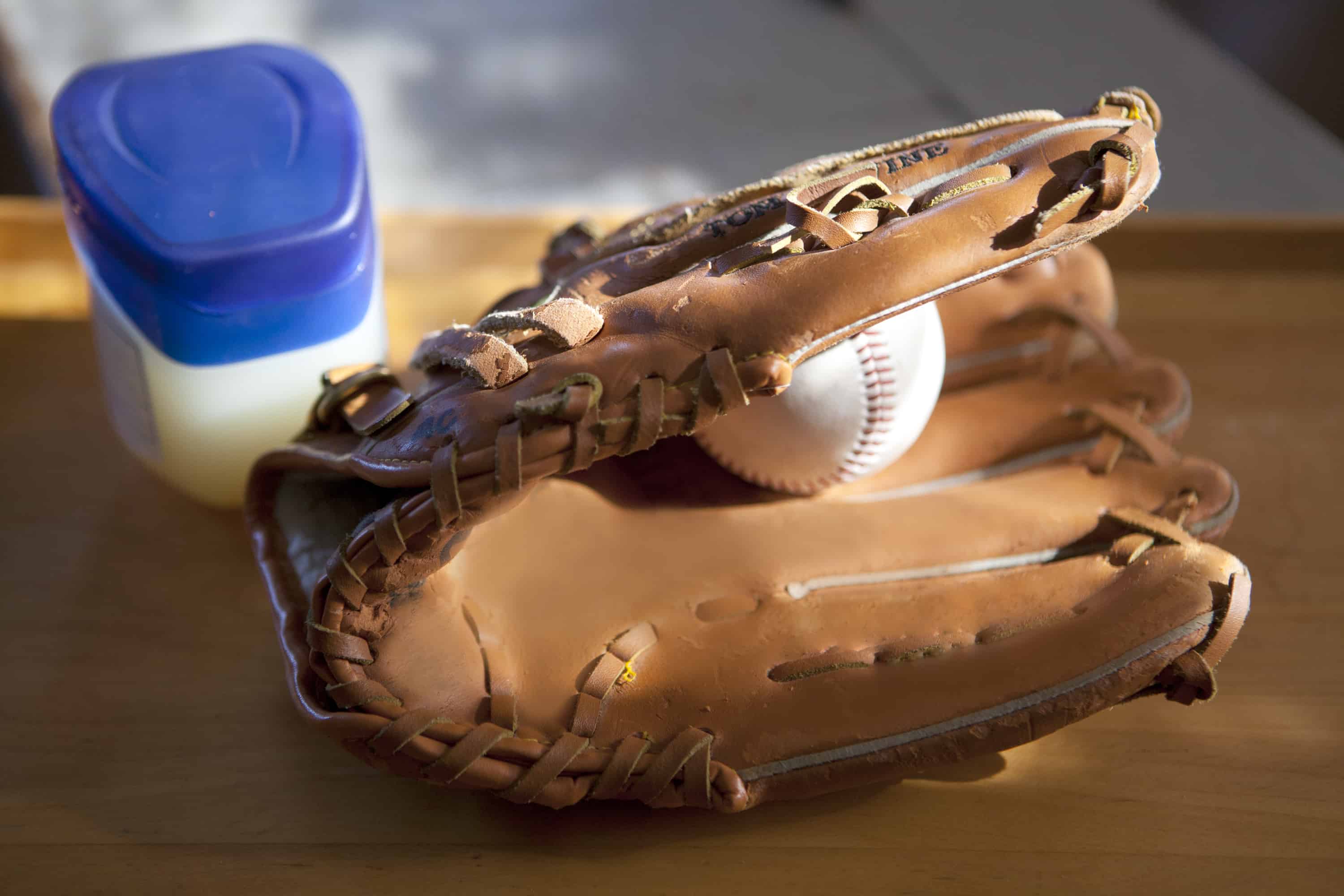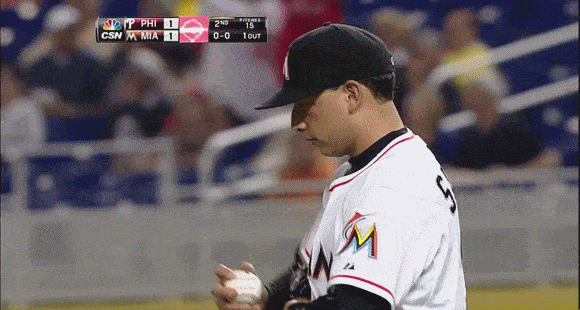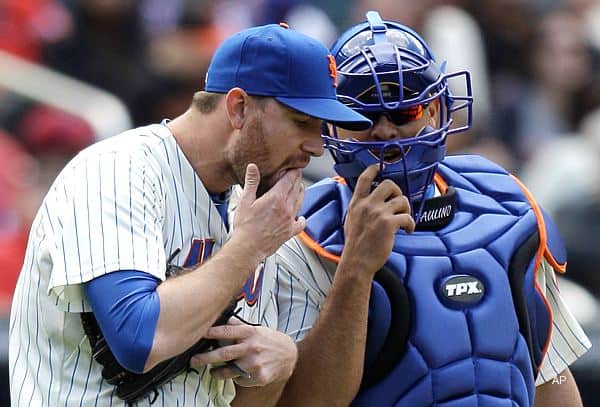If you’ve ever watched a major league baseball game, you might have noticed something. The pitchers sometimes lick their index and middle finger. This might leave a non-pitcher baffled.
Why do pitchers lick their fingers? Pitchers lick their fingers and hands to moisturize their skin just enough to have a better grip on the ball. By applying a little moisture to your finger tips and to the palm of your hand, the pores on your skin tighten up and increase the friction of your grip.
Imagine you’re outside on a cold or rainy day, the pores of your skin open and your grip isn’t quite as tight as it would usually be.
Given the various conditions and physical tolls pitchers face in a game, a simple solution such as applying a little spit may seem a little far out, but there’s a method to the madness.
How Does Spit Aid in Pitching A Ball ?
It may seem like a silly solution that many of us may not even consider, but if you’ve ever thrown a baseball, you know that it’s much more complicated than merely throwing a ball from point A to point B.
The longer the game goes on, the more fatigue and conditions begin to degrade the pitchers performance. Given the higher stakes mid way through the game, every pitch counts, so the player can’t afford to allow attrition to effect their abilities.
By applying a little bit of moisture to the skin, you gain more friction than you’d have before, as long as you wipe the excess moisture off before touching the ball itself.
Plus, players hands get covered in dirt, sweat, and grime; by cleaning their hand and removing the debris, the clean surface area of the finger tips creates a smooth surface for the moisture and greatly increases the pitchers grip and dexterity, both of which are required to throw a baseball with speed and precision.
You also have to take weather conditions into account. If a pitcher is playing on an exceptionally cold day, the hands get very dry. Think about the last time you were outside in the cold and you tried to accomplish a task that required fine motor skills of your fingers.
The odds are you didn’t have much movement in your hands due to the stiffness and lack of friction until you had the chance to warm them back up again.
Next time you’re outside in the cold, do a little experiment and try to do the same task after licking your finger tips and wiping them off on a dry surface, you may be shocked by how much something such as spit will enable you to finish the hypothetical task without having to warm your hands up first.
Rules Regarding the Application of Spit and Other Substances
MLB and Saliva
As per official MLB Rules and Regulations in 2018, a pitcher may bring his hand to his mouth while on the pitchers mound as long as he wipes his hand off afterwards.
Any pitcher who brings his hand to his mouth without wiping his hand off before touching the ball faces a penalty each time they do so in the form of having the pitch called as a ball.
It gets a little tricky here, a pitcher may not bring their hand to their mouth while in set or wind up position while in contact with the plate due to the fact it is constituted as an interrupted pitching motion.
A pitcher is allowed to blow on their fingers as well, which is another way of either warming the hand, or applying slight amounts of moisture to the hand itself, as long as they aren’t on the plate, since this is also considered an interrupted pitching motion that can disrupt the accuracy of the pitch.
There are also some stipulations that could affect this rule.
Former official MLB rules states both team managers and the umpire must come to a consensus before the start of the first inning saying they are all in agreement in regards to brining the hand to the mouth.
If not, players may not touch the ball after brining their hand into contact with their tongue or lips while within the 18 foot radius of the pitchers circle.
Due to the contradictory rulings, it seems like most players are willing to take the risk of getting a ball called by licking their finger tips.
The MLB versus Petroleum Jelly (Vaseline)
In the past, pitchers have been known to be a little more liberal with the rules and would be willing to take the chance of getting ejected from the game by applying petroleum jelly to their hands to give them an unfair advantage while pitching.
Pulling a sneaky like applying a lubricant like petroleum jelly would enable a pitcher to throw a ball and have it leave their hand much faster than it would with a dry hand.

It’s no secret that dirty tricks like these have cost teams a lot of unnecessary controversy that tarnished their reputations.
To remedy this, the MLB has rules that directly prohibit the application of petroleum jelly, in which if discovered, the pitcher can either be penalized and have the play deemed invalid, or the pitcher will be removed from the game.
In the most extreme circumstances, a player could even be fined due to the mishap if the use of cheating tactics persist.
The ban of Pine Tar
Unlike the aforementioned substances we’ve mentioned, the next substance is one of the most notorious substances in baseball and a favorite amongst batters, but banned for pitchers.
Pine tar is a blackish brown substance that is extracted from the roots and stumps of pine trees by subjecting the pine wood to immense heat that breaks the wood down and the residual residue is pine tar.
Pine tar is both legal and illegal in baseball.
It is illegal for pitchers to use it, think Micheal Pineda of the New York Yankees, because it allows for the pitcher to have a firmer grip on the ball due to the stickiness.
For batters, the rule is different. Pine tar is allowed to be applied on the handle of the bat up to a specific point on the bat so the batter can have have a more relaxed grip on the handle without running the risk of it slipping out of their hands.
Though many officials, players, and commentators would argue that banning pine tar is an outdated ruling since it’s okay to use a rosin bag, the ruling still stands.
Sunscreen
Sunscreen is perfectly legal, and encouraged, for players to wear during play.
Sunscreen isn’t legal when the player quickly rubs the rosin bag on their forearm with sunscreen on it and applies the sunscreen to their hands.
This is considered a violation of the rules but it is said to be one of the most common exploits pitchers use to gain a slight advantage while throwing a pitch.
Related Questions
What is a Spitball?
A spitball, emery ball, or shine ball is a highly illegal alteration to a baseball where a player applies a foreign substance like spit, Vaseline, or any type of substance that will alter how wind resistance affects the ball.
A spitball is often camouflaged by applying a layer of dirt or tobacco spit to give the ball a brownish hue that makes the deception less noticeable.
A spitball is pitched as if it were a fastball but has a trajectory like a knuckleball due to the earlier break from the pitchers hand.

Did you know that a spitball has killed a baseball player? In the 1920 season, pitcher Carl Mays threw a spitball covered in dirt and tobacco juice during dim playing conditions and lethally struck batter Ray Chapman in the middle meningeal artery (temple), after which the spitball was effectively banned from use during league play.
There have been several instances where officials have lobbied for the return of the spitball, stating it posed no risk to players, but to no avail and the pitch remains illegal to this day.
Can pitchers wear a thin glove on their throwing hand?
While the rules are a little vague in this area, there is nothing prohibiting a pitcher from wearing, for example, a batter’s glove on their throwing hand.
Given the precision a pitcher must throw a baseball with, it is seldom seen in major league play since a glove could drastically reduce the accuracy of a pitch as well as affect the speed at which a ball leaves the hand due to the increased friction the glove would have on the ball.
There are prohibitions for pitchers to have any type of attachment on their throwing hand or wrist, such as bracelets, sports tape, or band aids; the decision is ultimately left up to the umpire on a case by case basis, but the official rules prohibit it for the most part.


